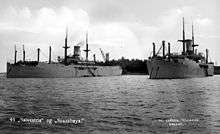Harold Salvesen
Captain Harold Keith Salvesen (died 1970) was a British businessman, who taught economics at the University of Oxford before becoming a partner in the whaling and shipping firm Christian Salvesen.
Early life, military service, and academia
Harold was the son of Theodore Salvesen, who had expanded the family shipping business into whaling in the late nineteenth century. By 1910 it had become the world's leading whaling firm, thanks to a major boom in Antarctic whaling. His mother was Annie Burnet, one of the earliest women to graduate from the University of London and sister of the academic John Burnet.[1] Harold was educated at Edinburgh Academy and the Royal Military College, Sandhurst, where he was a prize cadet.[2] On 12 May 1915 he was commissioned as a Second Lieutenant in the Indian Army,[3] and appointed to serve with the 42nd Deoli Regiment in November.[4] During the First World War, he served in the Middle East, Siberia, and Persia.[2] He was promoted to Lieutenant in 1917 (backdated to May 19196),[5] and retired from the Army as a Captain in 1923.[2] He continued to use the rank throughout his civilian career, finding it useful in conveying authority in a shipping business.[6]
After the war, Salvesen studied politics, philosophy and economics at University College, Oxford, and in 1923 was appointed a Fellow of New College to teach economics.[2] In his four years there, he taught a number of undergraduates who would become prominent Labour politicians, including Hugh Gaitskell, Frank Pakenham, and Richard Crossman, a fact of which he was greatly proud. Salvesen himself was broadly leftwing, declaring himself to be a Labour voter, but was generally distrustful of government and strongly opposed to nationalisation, His nephew, Gerald Elliot, recorded "a faith in entrepreneurial capitalism [and] sympathies for social welfare", and suggested that his dislike of the Conservative government was at least in part a reaction to Conservative politicians who he saw as pompous and imperialist.[7] While at Oxford, he took up a one-year fellowship to study at Harvard University in the United States.[2]
Whaling

In 1928 Salvesen left Oxford to enter the family business, alongside his brothers Noel and Norman and his cousin Iver. The work was divided among the partners, with Norman responsible for chartering and agency work and Iver handling merchant shipping. Noel, with his father Theodore, headed the whaling division, which Harold joined. After learning Norwegian - the universal language among the whalers - he spent the summers of 1928/29 and 1929/30 in the Antarctic, the first senior manager to actually visit the Southern Ocean whaling fleet, and came back arguing strongly for more investment and more modern practices. He oversaw the conversion of two factory ships for pelagic whaling, Salvestria and Sourabaya, and brought a new zeal and efficiency to the operations at South Georgia and at sea. The boom in Antarctic whaling came to an abrupt halt in 1930/31, with the price of oil dropping by half, and over the following years Salvesen was a leading player in the negotiations to establish an agreed catch quota among the whaling firms. His major achievement was to set the quota in terms of whales killed rather than oil produced, encouraging a less wasteful approach to whaling.[8]
As Harold grew more experienced with the business, he took over the operational aspects of running the fleet while Noel concentrated on selling the oil.[9] During the 1930s he reorganised the staffing of the Salvesen fleet to include more British seamen - it had previously been 95% Norwegian - resulting in repeated clashes with the Norwegian seamen's unions, but a growing closeness with the British National Union of Seamen.[10] On the outbreak of the Second World War the Salvesen fleet headed south for the Antarctic summer, returning in 1940 to find that their Norwegian home ports were now occupied by Germany. The following season, after three Norwegian factory ships were captured by the commerce raider Pinguin the government ordered the suspension of all whaling for the duration of the war, despite Salvensen's protests that whale oil was a valuable food source. The entire British whaling fleet was dispersed, with the factory ships leased to the Ministry of Transport as oil tankers and military transports, and the whalecatchers leased to serve as patrol ships and minesweepers. Over the following years Salvesen worked to shepherd this fleet of ships through the Battle of the Atlantic, with great losses; every Salvesen and Unilever factory ship was sunk, along with two of the large modern Norwegian factory ships.[11]
(...)
References
- ↑ Elliot, pp. 10-26
- 1 2 3 4 5 "Death of Captain Harold Keith Salvesen". Glasgow Herald. 2 February 1970.
- ↑ https://www.thegazette.co.uk/London/issue/29159/supplement/4540
- ↑ https://www.thegazette.co.uk/London/issue/29588/page/4984
- ↑ https://www.thegazette.co.uk/London/issue/30236/page/8460
- ↑ Elliot, p. 29
- ↑ Elliot, p. 56
- ↑ Elliot, pp. 27-34
- ↑ Elliot, p. 46
- ↑ Elliot, pp. 36-38
- ↑ Elliot, pp. 46-48
- Elliot, Gerald (1998). A whaling enterprise : Salvesen in the Antarctic. Wilby, Norwich: Michael Russell. ISBN 0859552411.